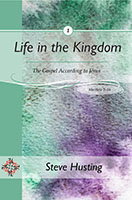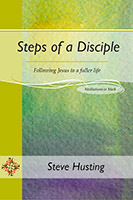For many of us, when we think about what it means that Jesus rose from the dead (the Easter story), we usually conclude that we’ll rise from the dead too. We will live forever because Jesus beat death. He will bring us to heaven.
To really bring out what the cross and resurrection mean to us on a daily basis, we turn from the brief tales of the crucifixion and resurrection in the gospels and let the epistles spell it out for us.
One instance is found in 1 Peter 2, where he addresses today’s suffering from the perspective of the cross of Christ. Has there been suffering in our lives lately? What has been our viewpoint toward the griefs we’ve been forced to endure?
Jesus was a perfect man—and He suffered. He therefore shows us how to suffer. As a matter of fact, when we believed in Jesus, the Spirit washed and regenerated us (Titus 3:5), and we became a new creation. That new creation has the spiritual capacity to think like Christ. When we do so, we start acting like Him too.
So how did Jesus view His suffering? What sustained Him in His extreme hour of trial? How should we expect to change?
Peter tells a persecuted, suffering people, “For this is commendable, if because of conscience toward God one endures grief, suffering wrongfully. For what credit is it if, when you are beaten for your faults, you take it patiently? But when you do good and suffer, if you take it patiently, this is commendable before God” (vv. 19-20).
When we suffer after doing what’s right and take it patiently, God accepts it. Jesus suffered unjustly, yet patiently. When God accepted the suffering of His Son, it’s almost like the suffering was an act of worship to God, like He was offering His pain as a sacrifice to the Father, and He accepted, not rejected, the offering.
This offering of Jesus is actually one of the reasons why Jesus’ death on the cross was better than that of bulls and goats (Hebrews 9:12) waiting to die at the Jewish altars long ago. They were tied to one of the horns on the corners of the altar so they wouldn’t get away. Unlike them, Jesus came willingly to do the will of God (Hebrews 10:5-9). Jesus went to the cross so the world would know how much He loved the Father (John 14:31).
How do we integrate this perspective into our lives? We offer the pain to God as our gift of love to Him. I remember being in the dentist’s chair, and as the dentist went to work—which hurt like crazy—I prayed, “Lord, You suffered on the cross for me, so I will suffer this for You. I will love You this way. Thank You for the opportunity to suffer for You.”
In this way we offer ourselves to God as living sacrifices (Romans 12:1), just as He offered Himself as a dying one. This is the mind of Christ.
I remember a point when I was grieved because the people around me did not understand the pain I felt when they misunderstood me as a deaf person and thoughtlessly said some hurtful things. I took that pain point to the Lord in prayer. He showed me that He too was misunderstood. The disciples did not understand who He was or the mission He had. But He still worked patiently with them, for that was a necessary part of His work. So I offered my pain to Him and continued with the people, knowing also that He had a purpose for me with them.
What is your pain point? It need not be physical pain. It could be any kind of mistreatment, unfair punishment, rejection, loneliness, or betrayal, for instance. Offer it to the Lord as a living sacrifice.
Jesus felt these pains. He was betrayed by Judas, one of His own band. He was mistreated and charged unjustly by a phony court. He experienced rejection and jeers from the people around the cross. He suffered the physical and mental agony of the Roman’s cruel form of torture.
As we endeavor to take on this new mindset, we’ll be met with resistance by the old person we were, what Paul called the “old man” (Romans 6:6). We see this old mindset in vv. 22-23, ” ‘Who committed no sin, Nor was deceit found in His mouth’; who, when He was reviled, did not revile in return; when He suffered, He did not threaten, but committed Himself to Him who judges righteously.”
Let’s be honest and say that the flesh in our old nature would have done exactly what the Lord refrained from doing. We would have yelled back curses of our own. We would threaten them. We would not trust God for the issue, but think of escaping and getting back at them.
The new creation in Christ, with the mind of Christ, can repent of those thoughts and see the suffering through Christ’s eyes of pain and offering. The same Spirit filling the Christ fills His disciples and makes this possible. Whenever we truly turn to the Lord in faith, we are released from bondage to the old man and can soar on eagle’s wings.
Christ had to keep suffering on the cross until all prophecies were accomplished, as He said in Luke 24:25-27: His clothing torn in two as prizes in a game (John 19:23-24). The crowd shredding His dignity with insults (Matthew 27:39-44). The feelings of alienation ripping Him from the Father (Psalm 22:1).
What kept the Christ on the cross? He died for our sin to set us free from its power, “who Himself bore our sins in His own body on the tree, that we, having died to sins, might live for righteousness—by whose stripes you were healed” (v. 24).
Christ died for our sins and was buried. When we believed in Him, our old man went into the grave with Him (Romans 6:5-7). When Jesus rose, we as a new creation rose with Him. With the indwelling of the Holy Spirit as our life coach, we learn to live the righteous life that is revealed only to those who walk by faith (Romans 1:17).
How are we healed by His wounds? This happens when the Spirit reveals to us (1 Corinthians 2:9-12) that Christ suffered for our sin and shame by bearing the lashes on His body. He experienced the penalty so we wouldn’t have to. Our need for or fear of punishment vanishes with the realization that He bore it all.
When this is brought home, we are healed. Healed of feelings of guilt and condemnation (Romans 8:1). Freed from endless busy-work to rest in the favor of God (Ephesians 1:6). We cease from doing dead religious works (Hebrews 9:14) that we do to appease Him, so every work becomes a glad offering to Him.
How does this journey of freedom from the power of sin and healing of our wounds take place? “For you were like sheep going astray, but have now returned to the Shepherd and Overseer of your souls” (v. 25). Not by more religious work but through returning to and acquainting ourselves with Him. The closer we draw to Him, the more we are freed from the weight of our sins, like wax melting away as it draws nearer to the light.
Everything goes wrong when we draw away from the Savior of the sheep. Our suffering is more acute when we don’t know the Shepherd at hand. Yet by faith we know He tends the flock and guides us along the way. When the Lord is our Shepherd, we won’t lack anything.
Christ knew that when He was lifted up, we would be drawn to Him (John 12:32). Being pinned to the cross would release us from our pains. Being buried in the tomb would open vistas of freedom. When the sun hid its face in shame (Matthew 27:45), it was for the glory of God to shine in our hearts in the face of Jesus Christ (2 Corinthians 4:6).
Resurrection Day is not a holiday to be quickly forgotten. Following the example of the suffering Servant (Isaiah 53:3-7), we rise above our trials as those who serve God. Let us bear our cross through His resurrection power, making each step of suffering a willing offering as we pursue Him who won us over by His love.






